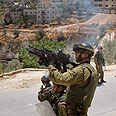
Victory is an elusive term
Photo: AP

Yoaz Hendel
On September 28, 2000, then-Opposition Leader Ariel Sharon visited Temple Mount. This seemingly insignificant event was enough for our partner Arafat to officially bid the Oslo peace dove farewell.
Exactly 10 years ago, the al-Aqsa Intifada erupted in full force. The IDF responded in line with orders, the area was on fire, and at Ehud Barak’s prime minister’s office officials attempted to cling to diplomacy in every possible way.
Military Stability
Guy Bechor
Op-ed: Given US weakness, IDF serves as strongest guarantee for Mideastern stability
It took some time to understand that this was war; Barak failed to understand it even at the end of his term in office. His replacement, Sharon – who usually acts quickly – regained his focused in an incredibly slow manner. The IDF, which was supposed to provide security, operated in line with the old insights and voluntarily limitations, as not to undermine the chances of renewing the peace, heaven forbid.
Yet the people on the street, who had no access to the “big picture” and the “overall considerations,” understood reality without getting lost in terminology; the kind of wisdom of people who find themselves fearing every trip out of the house, riding on buses, or going out to a restaurant or to the mall.
Meanwhile, “intellectual circles” in Israel engaged in an incisive debate on whether putting an end to the IDF’s restraint would solve the problem. Can the IDF cope with the suicide terror? Is a military capable of coping with a terror group that has no frontlines or home front and that does not adhere to ethics and the rules of war?
Results speak for themselves
On one end of the debate we had people who demanded that we fight with full force – the most prominent among them were members of the Yesha Council, who coined the slogan “Let the IDF win.” On the other end we had the Oslo fans, who had trouble reconciling themselves to the fact that their great spiritual leader, the peace process, passed away.As love of peace wasn’t a logical enough argument for limiting the IDF, negotiation-at-any-price fans resorted to military arguments. We are facing a war that cannot be won, one commentator explained. The IDF knows there is no military solution to terror, wrote another. There is no military solution, said Amram Mitzna in response to the Yesha Council’s slogan. Many others argued that the only way to resolve the problem is an all-out negotiation session.
Yet Arafat, who was not overly impressed by the pursuit of peace, escalated the acts of terror. At the end of the “terrible March” of 2002, after the outcome of the terror attack at the Park Hotel became known, the politicians decided to let the IDF win.
The limits on invasion into Palestinian Authority territory were lifted. IDF units entered Area A and the PA’s terror strongholds. The army was allowed to carry out arrests deep in enemy territory and resort to assassinations of terror leaders. Thousands of operational spoons emptied the terror barrel.
We can see the results in the numbers: In 2002, at the height of the terror wave, when it was declared that terror cannot be defeated, 232 civilians died here, most of them in the 53 suicide bombings carried out across the nation. In 2007 and 2008 we only saw two suicide bombings, one in each year. In the past two years, no suicide bombers exploded here.
Victory is an elusive term in the world of small wars. Victory is always temporary and not guaranteed to last. Yet if you ask me, the fact that I walk around with my children in Jerusalem’s Mahne Yehuda Market without fear, 10 years later, means that we won.
- Follow Ynetnews on Facebook















